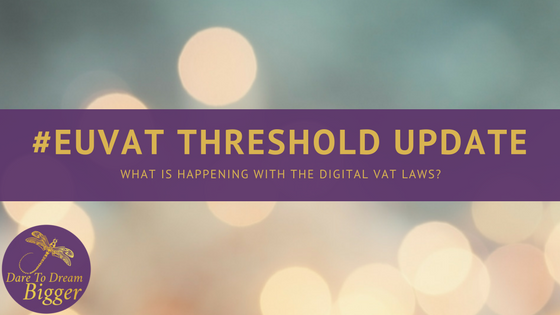Three years ago this week a small group of businesswomen met for the first time, having only previously chatted on social media. They were surrounded by some of the most senior people in the UK’s Treasury and HMRC and a government minister, who told them nothing could be done about the EU VAT law change that had accidentally closed down thousands of micro businesses.
Those women gave them hell over a change to EU VAT laws that all 28 Member State governments had voted in, which risked putting millions of microbusinesses out of business – or forcing them to trade illegally.
The law was a good idea – to make you pay VAT on digital stuff (think eBooks / MP3s / software downloads) based on where the CUSTOMER was, not the selling business. It was intended to stop the likes of Apple and Amazon avoiding tax by locating in low-VAT countries.
BUT We Needed EU VAT Thresholds
The sledgehammer that cracked the nut didn’t realise that most online businesses:
- Are tiny, compared to Amazon, so don’t have an international tax team
- Automatically sell internationally, because that’s how the internet works
- Don’t have access to the data to prove where our customers are in the way the laws required, so we could’t comply with the new rules
Over the following two years, the volunteers who supported the EU VAT Action Campaign:
- proved the disastrous unintended consequences of these laws with a 2000-business quantitative study
- met with the UK government, including the UK Prime Minister and the most senior policy advisers at Downing Street
- evidenced the need for EU VAT thresholds and proved to the finance ministries that they wouldn’t lose out by agreeing to them
- got consultative status with the UK’s HMRC, HM Treasury and the European Commission, so we could represent the thousands of businesses who desperately needed their help
- represented those businesses at the 2015 Fiscalis event, with representatives of all 28 Member States’ Finance Ministries – which was pivotal in proving the need for thresholds and convincing Finance Ministers to consider them
- raised the profile of the problem with savvy social media campaigns, including a Twitter storm that got #EUVAT trending
- got thousands of micro businesses taking positive action – writing to their MEPs, visiting their MPs, getting the word out there to create an unignorable case for the need for change
- giving keynote speeches at the European Parliament, to motivate MEPs, the European Commission and business organisations to take action
I am honoured to have been a co-founder of that group, to have given those keynotes and to have spoken at the Fiscalis event. I am immensely grateful to the thousands of businesses who supported us over the past three years.
On 1st December last year, Pierre Moscovici announced proposals for EU VAT thresholds. This was a HUGE achievement from EVERYONE , but the proposals had to spend a year going through Tax Committee meetings, being debated and looked at from every angle. They could have been derailed at any point. Ironically, the work we did meant that there was no way to rush these changes through. The EU Commission took the impact assessment very seriously.
Over the summer, 26 of the 28 Member States had agreed to a €10k EU VAT threshold (for non-domestic digital B2C sales), below which domestic VAT rules would apply, and €100k EU VAT threshold below which simplifications to the rules would apply, allowing growing businesses to keep trading. We continued to work with the EU Commission and key Member States to help address the remaining objections.
And today was the Big Day – ECOFIN – the meeting of all 28 Finance Ministers – had to vote on the legislative changes. Here is what happened:
The new EU VAT thresholds won’t come into effect until 1st January 2019, so we are urging micro business owners to write to their tax authority and Finance Minister to ask what can be done to help them keep trading until they legally become exempt from these rules.
Thank you so much to everyone who helped us with this campaign. Over and over we have been told that the reason it succeeded is because it was positive, evidence-based and proactive, rather than looking to blame or sling mud. We couldn’t have done it without your support.
If you’re covering this news and want to interview me for comments, you can reach me here.
And if you’ve got questions, we’re continuing the discussion in our Facebook group: EU VAT Action Campaign Group.
Thank you!
![]()
P.S. Know anyone who was stressed about these rules? Are you part of any small business groups? Please share this update with them!








 And I’ve Got A Treat For You:
And I’ve Got A Treat For You:
